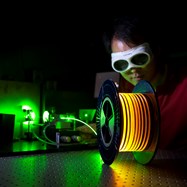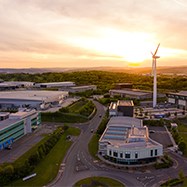How Imperial College London helped one small business bend boundaries
Design manufacturing company RoboFold drew on Imperial College London expertise in mathematical modelling to increase the performance of their robotic systems, enabling them to expand into new markets. The expertise was accessed through the College’s consultancy company, Imperial Consultants (ICON).
Since its launch in 2008, RoboFold has generated interest across the architecture and interior design sectors. They use a robotic manufacturing system to create curved metal forms for furniture, art installations and cladding. The entire process is simulated in Computer Aided Design software, with the robots programmed to fold sheet metal along pre-scored lines. But to move into mass production markets like the automotive industry the RoboFold system needed to perform with greater precision.
Dr Daniel Balint, a material deformation expert with experience in mathematical modelling based at Imperial’s Department of Mechanical Engineering, worked with RoboFold Managing Director Gregory Epps to improve the system.
Although each metal sheet is manipulated directly by the robots, other factors, like the elastic recovery of the material, can distort its deformation. These factors need to be accurately accounted for when programming the robots. Dr Balint devised a set of mathematical models to predict the effects of the robotic folding on sheet metal and used these to optimise the robots’ programming.
The flexible and focussed nature of consultancy meant that RoboFold could access the specialist expertise it needed and enabled the business to expand.
-
Hamir Patel
hamir.patel@russellgroup.ac.uk
020 3816 1316
-
Stephanie Smith
020 3816 1310
 X
X


